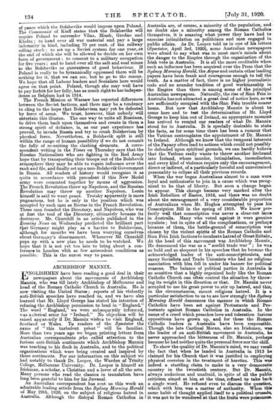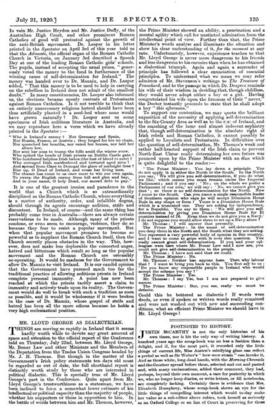ARCHBISHOP MANNIX.
IliNGLISIIMEN have been reading a good deal in their U newspapers about the movements of Archbishop Meninx, who was till lately Archbishop of Melbourne and head of the Roman Catholic Church in Australia. He is now visiting the United States ; reports of his violently anti-British speeches have reached us, and we have also learned that Mr. Lloyd George has stated his intention of refusing the Archbishop permission to land in "England." The word " England," we were subsequently informed, was a clerical error for " Ireland." No objection will be raised apparently if Dr. Mannix wishes to visit England, Scotland or Wales. To readers of the Spectator the name of " this turbulent priest " will be familiar. More than two years ago we began printing letters from Australian correspondents ;rho called attention to the furious anti-British sentiments which Archbishop Mannix was teaching to his flock in Australia, and to the political organisations which were being created and inspired by these sentiments. For our information on this subject we had notably to thank Dr. Leeper, the Warden of Trinity College, Melbourne University. Dr. Leeper is himself an Irishman, a scholar, a Christian and a lover of all the arts. Many persons who read the classics in translation have long been grateful to him for his Juvenal. An Australian correspondent has sent us this week an admirable leading article from the Sydney Morning Herald of May 29th, 1920, on the subject of religious hatred in Australia. Although the disloyal Roman Catholics in Australia are, of course, a minority of the population, and , no doubt also a minority among the Roman Catholics themselves, it is amazing what power they have had to exercise intimidation on politicians and men engaged in public affairs. As Dr. Leeper told us in one of his letters (Spectator, April 3rd, 1920), some Australian newspapers were afraid to say what was in most men's minds about the danger to the Empire through the organization of the Irish vote in Australia. It is all the more creditable when such an influence has been acquired over the Press that the Sydney Morning Herald, the Argus and certain other leading papers have been frank and courageous enough to tell the truth. As a matter of fact, there is no higher journalistic code and no sounder tradition of good workmanship in the. Empire than there is among some of the principal Australian newspapers. Naturally, the rise of Sinn Fein in Australia has not attracted a great deal of notice here, as we are sufficiently occupied with the Sinn Fein trouble nearer home. But now that Archbishop Mannix is about to come here and to teat the determination of Mr. Lloyd George to keep him out of Ireland, an appropriate moment has arrived to remind ow readers of what Dr. Meninx stood for in Australia. It is specially desirable to state the facts, as for some time there has been a rumour that the Vatican contemplates the appointment of Dr. Mannix to Ireland. Although we know that the temporal interests of the Papacy often lead to actions which could not possibly be defended upon spiritual grounds, we can hardly believe that the Vatican really wants to throw another firebrand into Ireland, where murder, intimidation, incendiarism and every kind of violence require only the encouragement, direct or indirect, of a particularly forceful and unrestrained personality to eclipse all their previous records.
When the war began Australians almost to a man were loyal and enthusiastic to join in a cause which was recog- nized to be that of liberty. But soon a change began to appear. This change became very marked after the Irish Rebellion of Easter, 1916, and there was no doubt about the estrangement of a very considerable proportion of Australians when Mr. Hughes, to pass his Conscription Bill in the spring o 1918. We know per* fectly well that conscription was never a clear-out issue in Australia. Many who voted against it were genuine loyalists ; but in spite of all the complications, or perhaps because of them, the battle-ground of conscription was chosen by the violent spirits of the Roman Catholio and Sinn Fein Irish factions to inculcate hatred of Great Britain. At the head of this movement was Archbishop Mannix. He denounced the war as a " sordid trade war' ; he was so bold and so eloquent in his speeches that he became the acknowledged leader of the anti-conscriptionists, and many Socialists and Trade Unionists who had no religious association with him fell in under his banner for political reasons. The balance of political parties in Australia is so sensitive that a highly organized body like the Roman Catholic Church can often control the situation by throw- ing its weight in this direction or that. Dr Mannix never scrupled to use his great power to stir up hatred, and this; in the cireumatancea, meant religious hatred. It is a particular satisfaction to us to see how strongly the Sydney Morning Herald denounces the manner in which Roman Catholics have been set against Protestants and Pro- testants against Roman Catholics in Australia. le- the name of a creed which preaches love and, toleration furious oppositions have grown up, and for these the Roman Catholic leaders in Australia have been responsible. Though the late Cardinal Moran, also an Irishman, was the leader of an anti-British movement in Australia, he never approached the bitterness of Dr. Mannir, perhaps because he had neither quite the personal force nor the skill. To show the quality of Dr. Mannix's mind, we may recall the fact that when he landed in Australia in 1913 he claimed for his Church that it was justified in employing physical coercion in the treatment of heretics. This was indeed a startling claim to make in a very democratic country in the twentieth century. But Dr. Mannix, always audacious and unafraid, in spite of all the public criticism aimed at him at the time, refused to take back a single word. He refused even to discuss the question, which with him was a matter of authority. When this same habit of thought applied itself to a political crusade, it was not to be wondered at that the fruits were poisonous. In vain Mr. Justice Heydon and Mr. Justice Duffy, of the Australian High Court, and other prominent Roman Catholics of good will protested against the growth of the anti-British movement. Dr. Leeper in his letter printed in the Spectator on April 3rd of this year told us that the Advocate, the official organ of the Roman Catholic Church in Victoria, on January 3rd described a Speech Day at one of the leading Roman Catholic girls' schools. The pupils, instead of accepting the usual prizes, " gener- ously voted the money to the fund in furtherance of the -winning cause of self-determination for Ireland." The money was handed over to Dr. Mannix, and Dr. Leeper added, " That this money is to be used to help in carrying on the rebellion in Ireland does not admit of the smallest doubt." In many constituencies, Dr. Leeper also informed us, the elections became openly contests of Protestants against Roman Catholics. Is it not terrible to think that an entirely unnecessary religious hatred should have been thus artificially planted in a seed-bed where none would have grown naturally ? Dr. Leeper sent us some specimens of Irish seditious literature in Australia, and we may reproduce here a verse which we have already printed in the Spectator :- " Who is Ireland's enemy ? Not Germany and Spain,
Nor Russia, France, or Austria ; they forged for her no chain, Nor quenched her hearths, nor razed her homes, nor laid her altars low, Nor sent her sons to tramp the hills amid the winter snow. Who spiked the heads of Irish priests on Dublin Castle gate ? Who butchered helpless Irish babes (the lust of blood to sate) ? Who outraged Irish maidenhood and tortured aged sires ? And spread from Clare to Donegal the glare of midnight fires ? Rise up, 0 Dead of Ireland, and rouse her living men. The chance has come to us once more to win our own again, To sweep the English enemy from hill and glen and bay, And in your name, 0 holy Dead, our sacred debt to pay."
It is one of the greatest ironies and paradoxes in the world that a Church which is so extraordinarily disciplined as theRoman Catholic Church, where everything is a matter of authority, order, and infallible dogma, should through its agents encourage sedition, strife and discontent. In Ireland, of course—and the same thing has probably come true in Australia—there are always certain reservations to be made. Although many of the priests condone, or even seem to encourage, violence, they do so because they fear to resist a popular movement. But when that popular movement promises to become so powerful as to supplant the Roman Church itself, then the Church secretly places obstacles in the way. This, how- ever, does not make less deplorable the concerted' anger, ,hatred and bitterness which result so long as the popular movement said the Roman Church are ostensibly co-operating. It would be madness for the Government to allow Dr.- Mannix to visit Ireland. It is our candid opinion that the Government have pursued much too far the traditional practice of allowing seditious priests in Ireland complete personal immunity. A point has now been reached at which the priests tacitly assert a claim to immunity and actively trade upon its reality. The Govern- ment -would do well to break with such a tradition as soon as possible, and it would be wholesome if it were broken in the case of Dr. Marmix, whose gospel of strife and hatred has been all the more odious because he holds a very high ecclesiastical position.



































 Previous page
Previous page